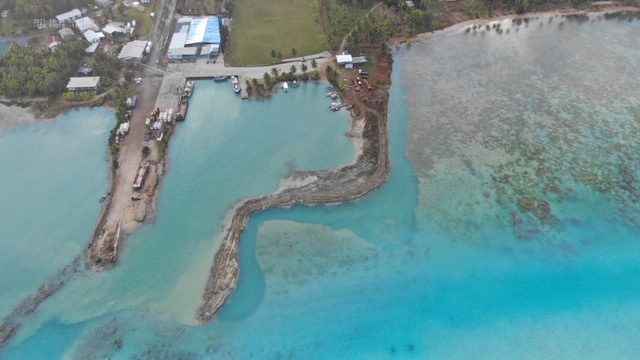Marine and lagoon assessment to begin in Aitutaki
Friday 1 March 2024 | Written by CI News Staff | Published in Environment, National

Aerial photographs of the dredging works at Arutanga Harbour in Aitutaki in 2021. 21110115.
The National Environmental Services (NES) has finally secured technical expertise to undertake a detailed marine biological baseline assessment of the marine benthic biomes and resources (biotic and abiotic) within the Aitutaki project sites.
The projects include the multi-million dollar Arutanga Harbour Project, which began in 2021 aimed at improving safety and usability of the harbour.
Concerns have been raised about the environmental impact of dredging carried out during phase one of the project, and questions were raised on the role of NES as an agency responsible for monitoring the project and its impact before, during, and after the development.
In August last year, NES said they were in the process of sourcing technical expertise to carry out effective monitoring of the development. When the project entered phase two in December 2023, NES was still waiting to secure technical assistance from the Ministry of Marine Resources (MMR) and external partners for environmental compliance and monitoring.
In a statement released yesterday, NES said they are pleased to embark on this project assignment from March 4 to 13.
NES director Halatoa Fua said: “We are pleased to embark on this project to strengthen NES’s capacity in environmental compliance and monitoring of coastal infrastructure development, and to provide sound technical advice for the decision-making process by the Aitutaki Environment Authority board.”
“This is a key milestone for NES’s technical capacity development which will set a clear data collection and assessment framework to assist with its work consistently in the future.”
According to the statement, NES has identified multiple cases of environmental impact, particularly in coastal and marine environments, related to various recent development projects in Aitutaki.
It has teamed up with the Ministry of Marine Resources and Climate Change Cook Islands, together with Integrated Aquatic Solutions (IAS), to provide technical consulting services to conduct activities on environmental baseline assessments, compliance and monitoring work.
The specific lagoon and coastal sites in Aitutaki they will focus on include:
- Group A – Impaired aquatic systems from modifications for infrastructure development – Arutanga harbour and lagoon ecosystems, Akitua causeway and passage, Vaipeka causeway, Tautu causeway and Vaipae causeway
- Group B – Tourist hotspots with cumulative impacts to the lagoon ecosystems: Tapuaetai lagoon and Maina lagoon.
The scope of work for the technical advice encompasses two main areas: baseline data collection to implement environmental safeguards and mitigate adverse impacts, and an environmental impact assessment to develop recommendations for future management actions and restoration efforts addressing any identified areas of environmental impact.
The baseline data collection will focus on sediment condition, water quality condition, water velocity measurements, marine biodiversity assessment, and other relevant recommended measures. The environmental impact will focus on human health, biodiversity (fauna and flora), benthic habitats (seabed and subsoil) and marine water quality.
“The marine resource and ecological assessment will utilise standard and acceptable international marine biological methods with the project’s marine ecologist to lead the efforts and manage all field activities.
“The marine assessment is to be undertaken using a free diving (snorkelling) and utilise scientific visual survey methods to acquire qualitative and quantitative habitat and resource assessment data and to provide a general description of the reef systems and benthic habitats/sea floor.”
The technical advice will guide NES’s decision making on environmental cumulative impacts relating to current and future infrastructure development in Aitutaki, the statement said.
“Information detailed will provide the marine biological baseline data for the background, impact assessment, and proposal monitoring measures for long term planning for NES.”
NES will organise stakeholder discussions, starting with the Island Government, to focus on specific community group opinions on current and long-term environmental issues/impacts on the marine ecosystem of the Aitutaki.
“NES will outline these plans to the Aitutaki community in the coming week,” the statement said.
Note: This article was amended on May 5, 2024, to remove the term 'delayed' from the headline and the opening sentence. The National Environment Service has clarified there was no timeframe set on delivering this work.















































